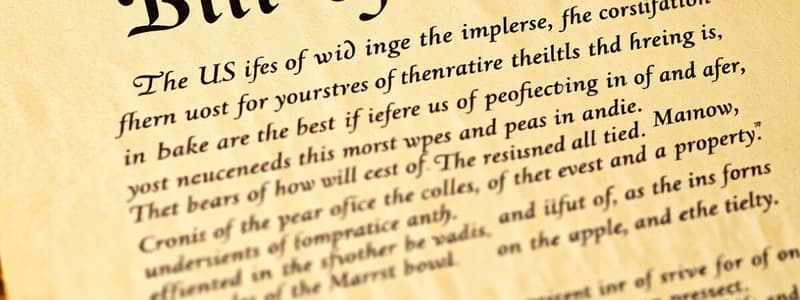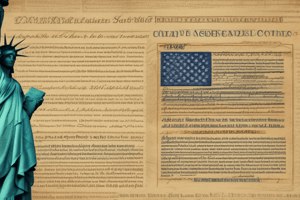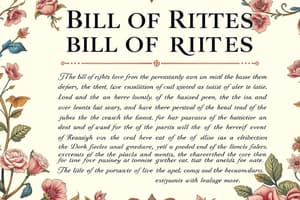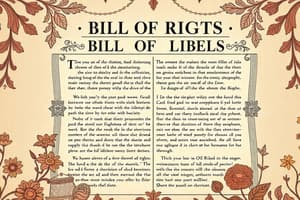Podcast
Questions and Answers
What is the minimum monetary value in controversy that ensures the right to a jury trial under the Seventh Amendment?
What is the minimum monetary value in controversy that ensures the right to a jury trial under the Seventh Amendment?
- $50
- $10
- $100
- $20 (correct)
Which of the following amendments addresses protection against excessive bail and unusual punishments?
Which of the following amendments addresses protection against excessive bail and unusual punishments?
- Eighth Amendment (correct)
- Ninth Amendment
- Seventh Amendment
- Tenth Amendment
Which statement best describes the purpose of the Ninth Amendment?
Which statement best describes the purpose of the Ninth Amendment?
- It addresses the right to a jury trial.
- It limits the powers of the federal government.
- It enumerates specific rights granted to the states.
- It emphasizes that not all rights are listed in the Constitution. (correct)
Who is credited with writing the Bill of Rights?
Who is credited with writing the Bill of Rights?
Why was the Bill of Rights added to the Constitution?
Why was the Bill of Rights added to the Constitution?
What was the outcome of the House's approval of the amendments?
What was the outcome of the House's approval of the amendments?
Which individual led objections regarding the authority of Congress to change the Constitution's wording?
Which individual led objections regarding the authority of Congress to change the Constitution's wording?
What was the final state legislature to ratify the Bill of Rights?
What was the final state legislature to ratify the Bill of Rights?
Which amendment requires a warrant for searching a person's home?
Which amendment requires a warrant for searching a person's home?
What outcome did Federalists advocate concerning government powers?
What outcome did Federalists advocate concerning government powers?
Which document most significantly influenced the Bill of Rights?
Which document most significantly influenced the Bill of Rights?
What does the First Amendment explicitly protect?
What does the First Amendment explicitly protect?
Which amendment prohibits the quartering of soldiers in private homes without consent?
Which amendment prohibits the quartering of soldiers in private homes without consent?
What is a primary requirement for issuing a search warrant as per the Fourth Amendment?
What is a primary requirement for issuing a search warrant as per the Fourth Amendment?
According to the Fifth Amendment, which of the following is prohibited?
According to the Fifth Amendment, which of the following is prohibited?
In which situation can a person be put in jeopardy of life or limb a second time according to the Fifth Amendment?
In which situation can a person be put in jeopardy of life or limb a second time according to the Fifth Amendment?
What is essential for ensuring the accused’s right to a fair trial, as established by the Sixth Amendment?
What is essential for ensuring the accused’s right to a fair trial, as established by the Sixth Amendment?
Which of the following rights is NOT guaranteed by the First Amendment?
Which of the following rights is NOT guaranteed by the First Amendment?
What type of law does the Fourth Amendment aim to protect citizens from?
What type of law does the Fourth Amendment aim to protect citizens from?
What rights do individuals have under the Sixth Amendment in criminal prosecutions?
What rights do individuals have under the Sixth Amendment in criminal prosecutions?
Flashcards
Bill of Rights
Bill of Rights
The first ten amendments to the US Constitution, guaranteeing fundamental rights and freedoms to citizens.
1st Amendment
1st Amendment
Guarantees freedom of religion, speech, the press, assembly, and the right to petition the government.
2nd Amendment
2nd Amendment
Enshrines the right of the people to keep and bear arms.
4th Amendment
4th Amendment
Protects against unreasonable searches and seizures, requiring warrants based on probable cause.
Signup and view all the flashcards
5th Amendment
5th Amendment
Guarantees due process of law, protection against self-incrimination, and double jeopardy.
Signup and view all the flashcards
6th Amendment
6th Amendment
Guarantees the right to a speedy and public trial, counsel, and other legal protections.
Signup and view all the flashcards
Freedom of Speech
Freedom of Speech
The right to express one's views and opinions without government censorship.
Signup and view all the flashcards
Freedom of Religion
Freedom of Religion
The right to practice any religion, or no religion, without government interference.
Signup and view all the flashcards
Due Process of Law
Due Process of Law
Fair treatment through the legal system. The government must follow established legal procedures.
Signup and view all the flashcards
Probable Cause
Probable Cause
Reasonable grounds to suspect that a person has committed, is committing, or is about to commit a crime, warranting an arrest or search.
Signup and view all the flashcards
Seventh Amendment
Seventh Amendment
Guarantees the right to a jury trial in civil cases.
Signup and view all the flashcards
Eighth Amendment
Eighth Amendment
Protects against excessive bail, fines, and cruel/unusual punishments.
Signup and view all the flashcards
Why Bill of Rights?
Why Bill of Rights?
To limit government powers and protect individual liberties.
Signup and view all the flashcards
Prohibition by First Amendment
Prohibition by First Amendment
Congress can't make laws establishing a religion or restricting free speech
Signup and view all the flashcards
Fourth Amendment protection
Fourth Amendment protection
Protects against unreasonable searches and seizures, requiring warrants.
Signup and view all the flashcards
Ratification of Bill of Rights
Ratification of Bill of Rights
Process where states approved the ten amendments.
Signup and view all the flashcards
Who wrote the Bill of Rights?
Who wrote the Bill of Rights?
James Madison wrote the amendments.
Signup and view all the flashcardsStudy Notes
Bill of Rights: The First Ten Amendments
- The Bill of Rights is one of the three founding documents.
- It was heavily influenced by the Virginia Declaration of Rights, and English documents like Magna Carta, Petition of Right, English Bill of Rights, and Massachusetts Body of Liberties.
- The first ten amendments protect individual liberties.
First Amendment
- Protects freedom of religion, speech, press, assembly, and petition.
- Congress cannot make laws establishing religion or limiting freedoms.
Second Amendment
- Protects the right of the people to keep and bear arms.
- States that a well-regulated militia is needed for security.
Third Amendment
- Prohibits the forced quartering of soldiers in private homes without consent.
- Covers both times of peace and war.
Fourth Amendment
- Protects against unreasonable searches and seizures.
- Warrants require probable cause, oath, and specific details.
Fifth Amendment
- Protects against self-incrimination.
- Guarantees due process of law.
- Prevents double jeopardy.
- Addresses taking private property for public use in exchange for just compensation.
Sixth Amendment
- Guarantees the right to a speedy and public trial by an impartial jury.
- Ensures accused have the right to know the charges, confront witnesses, and have an attorney.
Seventh Amendment
- Guarantees right to a jury trial in civil cases involving more than $20.
Eighth Amendment
- Prohibits excessive bail and cruel or unusual punishments.
Ninth Amendment
- States that the Constitution does not list all rights and that others are retained by the people.
Tenth Amendment
- Reserves powers not specifically given to the federal government to the states or the people.
Creators and Rationale
- James Madison wrote the amendments to limit government power and protect individual liberties.
- The Founders believed freedom of speech and worship are inherent rights.
- The Fourth Amendment protects against excessive government intrusion.
- Federalists favored a strong central government.
- Anti-Federalists wanted power to remain with state governments.
- Lack of limitations on government power in the original Constitution motivated the addition of the Bill of Rights.
Ratification Process
- The House approved 17 amendments.
- The Senate approved 12, and sent them to the states for approval in August 1789.
- 10 amendments were ratified.
- Virginia ratified the amendments on December 15, 1791, making it the final approval.
Studying That Suits You
Use AI to generate personalized quizzes and flashcards to suit your learning preferences.




